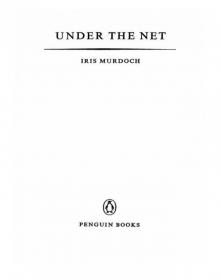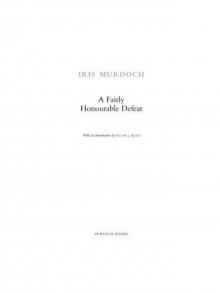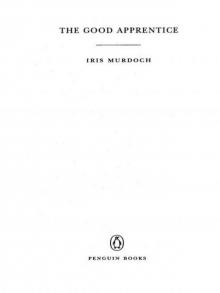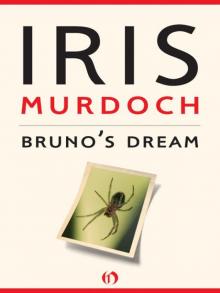- Home
- Iris Murdoch
Under the Net Page 6
Under the Net Read online
Page 6
Four
THE next day round about ten o‘clock I was walking down Welbeck Street. I was in a bad temper. By daylight the whole project seemed very much less attractive. I felt that to be snubbed by a film star would put me in a bad state of mind for months. But I regarded the matter as something which had been decided and which now simply had to be carried out. I often used this method for deciding difficult cases. In stage one I entertain the thing purely as a hypothesis, and in stage two I count my stage one thinking as a fixed decision on which there is no going back. I recommend this technique to any of you who are not good at making decisions. I felt a certain temptation to return to the theatre to see if I could find Anna again, but I was afraid of offending her. So there was nothing to be done but to get over with seeing Sadie.
Sadie’s flat was on the third floor, and I found the door open. A naive char appeared who told me that Miss Quentin was not at home. She then informed me that Miss Quentin was at the hairdresser, and she named an expensive Mayfair establishment. I had taken the precaution of mentioning that I was Miss Quentin’s cousin. I thanked her and set off again towards Oxford Street. I have often visited women in hairdressing establishments and the idea held no terrors for me. Indeed I find that women are often especially charitable and receptive if one visits them at the hairdresser, perhaps because they like being able to show off some captive member of the male sex to so many other women when the latter are not so fortunate as to have their male retainers by them. To play this role, however, one must be presentable, and so I went straight away to a barber’s and had a good shave. After that I bought myself a new tie in a shop in Oxford Street and threw away my other tie. As I mounted the heavily perfumed stairway of Sadie’s hairdresser and caught a glimpse of myself in a mirror I thought that I looked a fine figure of a man.
Women’s hairdressers obey some obscure law of nature which rules that, contrary to what is the case in other spheres, the more expensive the firm the less is the privacy given to the clients. Shop girls in Putney can have their hair done in the seclusion of a curtained cubic‘e, but wealthy women in Mayfair have to sit exposed in rows and watch each other being metamorphosed. I found myself in a big room where elegant heads were in various stages of assembly. A row of well-dressed backs were presented to me, and as I looked up and down searching for Sadie, I felt myself under observation in a dozen rose-tinted mirrors. I couldn’t see her anywhere. I started to glide along one of the rows, looking into each mirror, and seeing here a young face and there an old one looking at me from under crimped and plastered locks. Each pair of eyes met mine with a questioning look until I began to feel like a prince in a fairy tale. I was glad I had thought of investing in the new tie. At the end of the row there were several figures whose heads were covered by purring electric driers. Here at last I met in the mirror a pair of eyes which were unmistakably Sadie’s.
I stopped and put my hands on the back of her chair. I stood a while and looked gravely into these eyes while their owner returned my glance first with casualness, then with hostility, and at last with dawning recognition.
Sadie gave a little scream. ‘Jake!’ she cried.
I could feel we were being looked at. I began to be pleased that I’d come.
‘Hello, Sadie!’ I said, and I didn’t have to fake my delighted smile.
‘My dear creature,’ said Sadie. ‘I haven’t seen you for centuries! How lovely! Were you looking for me?’
I said that I was, and I fetched a chair and sat just behind her shoulder. We grinned at each other in the mirror. I thought we were a fine-looking pair. Sadie looked very handsome, even with her hair in a net, and if anything younger than ever. Even allowing for the rosy glass, her complexion was exquisite, and her brown eyes were absolutely blazing with vitality. I quite involuntarily put my hand on her arm.
‘You charming fellow!’ said Sadie. ‘What sports do you devise these days? Tell me all!’
There was an affectation in her voice and manner which struck me as new. Also she spoke in a curiously loud and ringing tone so that what she said echoed audibly all the way down the room. The explanation of this occurred to me in a moment; she was partly deafened by the purr of the drier and didn’t realize how loudly she was speaking.
I replied, also raising my voice, ‘Oh, I’m still at the old writing game. Books, books, you know. I’ve got about three on hand at the moment. And publishers will keep pestering me.’
‘You always were such a clever chap, Jake,’ Sadie shouted admiringly.
Silence reigned throughout the rest of the shop except for the whispering voices of a few assistants, and I could feel every ear strained in our direction. I thought it impossible that there was anyone in the room who didn’t know who Sadie was. I settled down to enjoy the conversation.
‘How’s life treating you?’ I asked.
‘Oh, it’s too utterly boring,’ said Sadie. ‘I’m simply worn out with work. On the set from dawn to dusk. I’ve only just managed to escape to get my hair done here in peace. I’ve quarrelled with the hairdresser at the studio. I’m so tired, I quarrel with everyone these days.’ She cast me an enticing smile.
‘When are you going to have dinner with me, Sadie?’ I asked.
‘Oh, darling,’ said Sadie, ‘I’m tied up for days and days. Someone’s even coming to fetch me away from this place. You must come round some time and have a drink at my flat.’
I calculated quickly. Sadie’s days probably were heavily mortgaged and this might be my only opportunity of talking with her for some time. So if I was going to raise the ticklish subject it had better be done now.
‘Listen, Sadie,’ I said, lowering my voice.
‘What’s that, darling?’ shouted Sadie from under the drier.
‘Listen!’ I shouted back. ‘I gather that you want to let your flat while you’re away.’
I couldn’t bring myself, in front of such an audience, to put the matter less delicately. I hoped that Sadie would pick it up with tact.
Sadie’s response was even more amiable than I had bargained for. ‘My dear boy,’ she said, ‘don’t speak of letting. I want a caretaker, in fact I want a bodyguard - and you can take on from now if you like.’
‘Well, I’d be very glad,’ I said. ‘The lease of my present place has just expired and I’m pretty well on the streets.’
‘Then, my dear, you must come at once,’ roared Sadie. ‘You’ll be most enormously useful if you can just be around the place a little. You see, I’m being persecuted by the most frightful man.’
This sounded interesting. I could feel the ears being pricked up all round us. I laughed in a masculine way.
‘Well, I suppose I’m fairly tough,’ I said. ‘I don’t mind keeping an eye on things, provided I can get some work done too.’ Already I had visions of something even better than Earls Court Road.
‘My dear, it’s an enormous flat,’ said Sadie. ‘You can have a suite of rooms. I’ll just feel so much safer if you can come and stay there till I go away. This fellow is quite madly in love with me. He keeps calling and trying to get in at all hours, and when he doesn’t cail he rings up, and I’m just a nervous wreck.’
‘You won’t start being afraid of me, I suppose?’ I said, leering at her in the glass. Sadie went off into peals of laughter. ‘Jake, darling, no, you’re just too utterly harmless!“ she called out.
I didn’t so much care for this turn in the conversation. Out of the comer of my eye I could see several elegantly dressed women craning their necks to get a look at me. I felt we should change the subject.
‘Who is this intolerable person?’ I asked.
‘I’m afraid it’s the big chief himself, it’s Belfounder,’ said Sadie. ‘So you can just imagine how embarrassing it all is. I’m simply beside myself.’
At the utterance of this name I nearly fell off my chair. The room spun round and round, and I seemed to be seeing Sadie through a cloud. This altered everything. With an enormous effort I kept my face compos
ed, but my stomach was rearing inside me like a wild cat. I wanted nothing now but to get away and think over this astonishing news.
‘Are you sure?’ I said to Sadie.
‘My sweet boy, I know my own boss,’ said Sadie.
‘I mean, sure that he loves you,’ I said.
‘He’s absolutely demented about me,’ said Sadie. ‘By the way,’ she said, ‘how did you know I wanted a caretaker?’
‘Anna told me,’ I said. I was beyond caution now.
Sadie’s eye glittered in the mirror. ‘So you’re seeing Anna again,’ said Sadie.
I hate that sort of remark. ‘You know Anna and I are old friends,’ I said.
‘Yes, but you haven’t been seeing her for ages, have you?’ said Sadie, still at the top of her voice.
I began to dislike the conversation very much indeed. I just wanted to get away.
‘I’ve been in France for a considerable time,’ I said.
I didn’t imagine Sadie had any close knowledge of Anna’s doings. I could see Sadie’s face focused now into a look of intelligent venom. She looked like a beautiful snake; and the curious fantasy came to me that if I were to look under the drier at the real face and not at the reflection I should see there some terrible old witch.
‘Well, you call on me next Tuesday, early,’ said Sadie, ‘and I’ll install you. I mean it about this bodyguard act.’
‘That’ll be splendid, Sadie dear,’ I said automatically, ‘I’ll be sure to come.’ And I rose.
‘I have to see my publisher,’ I explained.
We exchanged smiles, and I strode out of the place, followed by a large number of fascinated female eyes.
I omitted to mention earlier that I am acquainted with Belfounder. As my acquaintance with Hugo is the central theme of this book, there was little point in anticipating it. You will hear more than enough on this subject in the pages that follow. I had better start by explaining something about Hugo himself and then I will tell you of the circumstances in which I first met him and something of the early days of our friendship. Hugo’s original name was not Belfounder. His parents were German, and his father adopted the name Belfounder when he came to live in England. He found it, I believe, on a tombstone in a Cotswold churchyard, and he thought that it would be good for business. It evidently was, for Hugo in due course inherited a flourishing armaments factory, and the firm of Belfounder and Baermann, Small-arms, Ltd. Unfortunately for the firm, Hugo was at that time an ardent pacifist; and after various upheavals, in the course of which the Baermann faction withdrew, Hugo was left with a small concern which came to be called Belfounder’s Lights and Rockets Ltd. He had contrived to convert the armaments factory into a rocket factory; and here for some years he concerned himself with the manufacture of rockets, Very lights, small commercial dynamite, and fireworks of all kinds.
It started out, as I say, a small concern. But somehow money always stuck to Hugo, he simply couldn’t help making it; and within a short time he was extremely rich and prosperous, almost as prosperous as his father had been. (No one can be quite as prosperous as an armaments manufacturer.) He always lived simply, however, and at the time I first got to know him he used to work on and off as a craftsman in his own factory. His speciality was set pieces. As you probably know, the creation of a set piece is a highly skilled affair, calling for both manual dexterity and creative ingenuity. The peculiar problems of the set piece delighted Hugo and inspired him: the trigger-like relation of the parts, the contrasting appeal of explosion and colour, the blending of pyrotechnical styles, the methods for combining éclat with duration, the perennial question of the coda. Hugo treated the set piece as if it were a symphony; he despised the vulgarity of representational pieces. ‘Fireworks are sui generis,’ he once said to me. ‘If you must compare them to another art, compare them to music.’
There was something about fireworks which absolutely fascinated Hugo. I think what pleased him most about them was their impermanence. I remember his holding forth to me once about what an honest thing a firework was. It was so patently just an ephemeral spurt of beauty of which in a moment nothing more was left. ‘That’s what all art is really,’ said Hugo, ‘only we don’t like to admit it. Leonardo understood this. He deliberately made the Last Supper perishable.’ The enjoyment of fireworks, according to Hugo, ought to be an education in the enjoyment of all worldly splendour. ‘You pay your money,’ said Hugo, ‘and you get an absolutely momentary pleasure with no nonsense about it. No one talks cant about fireworks.’
Unfortunately he was wrong, and his theories turned out to be his own undoing as a craftsman. Hugo’s set pieces began to be in enormous demand. No smart house-party or public festival was complete without one. They were even exported to America. Then the newspapers began to talk, and to refer to them as works of art, and to classify them into styles. This so much disgusted Hugo that it paralysed his work. After a while he began to conceive a positive hatred for set pieces, and after a while he abandoned them altogether.
It was through the common cold that I first met Hugo. This was in a period when I was particularly short of cash, and things went very ill indeed with me until I discovered an incredibly charitable arrangement whereby I could get free board and lodging in exchange for being a guinea pig in a cold-cure experiment. The experiment was going forward at a delightful country house where one could stay indefinitely and be inoculated with various permutations of colds and cures. I dislike having a cold, and the cures never seemed to work when they tried them on me; but on the other hand it was free, and one got fairly used to working with a cold, which was good practice for ordinary life. I managed to get a lot of writing done, at least up to the time when Hugo appeared.
The controllers of this charitable scheme used to propose to the victims that they be domiciled in pairs since, as they observed in the prospectus, few people can tolerate complete solitude. I don’t care for solitude myself, as you know, but after a few tries I came to dislike even more the company of garrulous fools, and when I returned to this admirable place for a second season I asked to be allowed to live alone. The limited and protected isolation which such an institution offers in fact suits me quite well. This was granted; and I was hard at work, and battling too with a particularly appalling cold, when it was announced to me that the accommodation problem was now such that I must after all accept a companion. I had no choice but to agree, and I looked with very ill favour upon the enormous shaggy personage who then shambled in, put his things on the bed, and sat down at the other table. I grunted some sort of ungracious greeting, and then returned to my work, to make it clear that I was no fit companion for a chatterbox. I was further irritated by the fact that whereas I had only the cold, my companion was given both the cold and the cure, so that while I was choking and sneezing and using up a sackful of paper handkerchiefs, he remained in complete possession of his human dignity, and looking the picture of health. It was never clear to me on what principle the distribution of inoculations was made, though it always seemed that I got more than my fair share of colds.
I had feared that my companion would chatter, but it was soon plain that there was no such danger. Two days passed during which we did not exchange a single word. He seemed, indeed, absolutely unaware of my presence. He neither read nor wrote, but spent most of his time sitting at the table and looking out of the window across the pleasant parkland that surrounded the house. He sometimes mumbled to himself and said things half under his breath. He bit his nails prodigiously and once he produced a pen-knife and absently chipped holes in the furniture until one of the attendants took it from him. I thought at first that perhaps he was mentally deficient. During the second day I even, began to feel a little nervous of him. He was extremely large, both stout and tall, with very wide shoulders and enormous hands. His huge head was usually sunk low between his shoulders, while his brooding gaze traced around the room or across the countryside a line which seemed to be suggested by none of the ordinary objects which lay in
his field of vision. He had dark rather matted hair and a big shapeless mouth which opened every now and then, occasionally emitting a semi-articulate sound. Once or twice he began humming to himself, but broke off abruptly on each occasion — and this was the nearest he seemed to get to acknowledging my presence.
By the evening of the second day I was completely unable to go on with my work. Devoured by mingled nervousness and curiosity, I sat too looking out of my window, and blowing my nose, and wondering how to set about establishing the human contact which was by now become an absolute necessity. It ended up with my asking him, with undiplomatic abruptness, for his name. He had been introduced to me when he arrived, but I had paid no attention then. He turned towards me a very gentle pair of dark eyes and said his name: Hugo Belfounder. He added: ‘I thought you didn’t want to talk.’ I said that I was not at all averse to talking, that I had just been rather immersed in something when he arrived, and I begged his pardon if I had appeared churlish. It seemed to me, even from the way he spoke, that he was not only not mentally deficient, but was highly intelligent; and I began, almost automatically, to pack up my papers. I knew that from now on I should do no more work. I was closeted with a person of the utmost fascination.

 Jackson's Dilemma
Jackson's Dilemma The Flight From the Enchanter
The Flight From the Enchanter The Red and the Green (Vintage Classics)
The Red and the Green (Vintage Classics) A Severed Head
A Severed Head The Black Prince
The Black Prince The Nice and the Good
The Nice and the Good The Unicorn
The Unicorn Under the Net
Under the Net The Italian Girl
The Italian Girl A Fairly Honourable Defeat
A Fairly Honourable Defeat An Accidental Man
An Accidental Man A Word Child
A Word Child The Philosopher's Pupil
The Philosopher's Pupil The Book and the Brotherhood
The Book and the Brotherhood The Good Apprentice
The Good Apprentice The Sacred and Profane Love Machine
The Sacred and Profane Love Machine The Bell
The Bell Henry and Cato
Henry and Cato Metaphysics as a Guide to Morals
Metaphysics as a Guide to Morals The Time of the Angels
The Time of the Angels Nuns and Soldiers
Nuns and Soldiers The Green Knight
The Green Knight The Sea, the Sea
The Sea, the Sea Sartre: Romantic Rationalist
Sartre: Romantic Rationalist Bruno's Dream
Bruno's Dream An Unofficial rose
An Unofficial rose Sartre
Sartre The Red and The Green
The Red and The Green